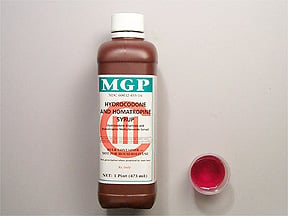
Hydromet Coupons & Savings Card – Discount Prices from $474.30
Brand for: Hydrocodone bitartrate-homatrop methylbromide
My prescription
Edit
120ML of 5-1.5MG/5ML, Hydrocodone Bitartrate-homatrop Methylbromide (120 Bottles)
Select pharmacy

CVS
$845.60
COUPON PRICE
Walgreens
$474.30
COUPON PRICE
Albertsons
$809.90
COUPON PRICE
Walmart
$2399.29
COUPON PRICEHydromet savings card
Show this card to your pharmacist
Walgreens
$474.30
BIN
ID
PCN
GRP
015995
LHKPY543265
GDC
DR33
Powered by
Related opioid / anticholinergic combinations prescriptions
More prescriptions for cough
Related opioid / anticholinergic combinations prescriptions
More prescriptions for cough
Price history for Hydromet (brand) & Hydrocodone Bitartrate-homatrop Methylbromide (generic)
120 Bottles, 120ML of 5-1.5MG/5ML
Average retail price for Hydromet
Average retail price for Hydrocodone Bitartrate-homatrop Methylbromide
Average SaveHealth price for Hydrocodone Bitartrate-homatrop Methylbromide
Our price history data is based on aggregated prescription data collected from participating pharmacies in America. Our prescription data updates daily to reflect the latest price changes. If you notice a missing data point, it means there wasn't sufficient data available to generate a monetary value for that date.
Over the last 12 months, the average discount price of Hydromet is $1206.42 using the SaveHealth savings card. That's an average savings of 93.55% on Hydromet with our discount card.
*Retail prices are based on pharmacy claims data, and may not be accurate when we don't have enough claims.
Hydromet (Hydrocodone Bitartrate-homatrop Methylbromide) dosage forms
Dosage Quantity Price from Per unit 120ML of 5-1.5MG/5ML 120 Bottles $867.26 $7.23 120ML of 5-1.5MG/5ML 60 Bottles $446.78 $7.45 120ML of 5-1.5MG/5ML 100 Bottles $727.10 $7.27 120ML of 5-1.5MG/5ML 140 Bottles $1007.42 $7.20 120ML of 5-1.5MG/5ML 240 Bottles $1708.22 $7.12
| Dosage | Quantity | Price from | Per unit |
|---|---|---|---|
| 120ML of 5-1.5MG/5ML | 120 Bottles | $867.26 | $7.23 |
| 120ML of 5-1.5MG/5ML | 60 Bottles | $446.78 | $7.45 |
| 120ML of 5-1.5MG/5ML | 100 Bottles | $727.10 | $7.27 |
| 120ML of 5-1.5MG/5ML | 140 Bottles | $1007.42 | $7.20 |
| 120ML of 5-1.5MG/5ML | 240 Bottles | $1708.22 | $7.12 |
Why do doctors prescribe hydromet?
Doctors prescribe Hydromet primarily to relieve cough and alleviate symptoms associated with upper respiratory tract infections. It contains hydrocodone, which is a cough suppressant, and homatropine, which helps to reduce the risk of misuse. It is typically used when a cough is severe and not relieved by other medications.
Why do doctors prescribe hydromet?
Doctors prescribe Hydromet primarily to relieve cough and upper respiratory symptoms associated with allergies or the common cold. It contains hydrocodone, which is a cough suppressant, and homatropine, which helps to reduce the risk of misuse. It is important for patients to use this medication as directed by their healthcare provider.
Using the SaveHealth discount card, what is the price of Hydromet without insurance?
Using the SaveHealth discount card, the price of Hydromet without insurance is $474.30.
What is the price of Hydromet at CVS?
The price of Hydromet at CVS is $845.60.
What is the price of Hydromet at Walgreens?
The price of Hydromet at Walgreens is $474.30.
What is the price of Hydromet at Walmart?
The price of Hydromet at Walmart is $2399.29.
